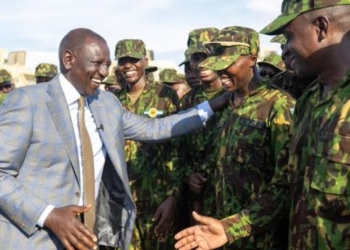The recent surge of Gen-Z protests has illuminated the genuine concerns and voices of our youth, calling for significant change and recognition. However, these protests have been marred by troubling incidents of violence against Kenyans, including journalists.
Notable examples include the abduction of Macharia Gaitho, the shooting of MediaMax journalist Catherine Wanjeri wa Kariuki in Nakuru, and the assault on CNN photojournalist Fabien Muhire while on duty. These attacks on journalists are unacceptable and must be condemned unequivocally.
Peaceful demonstrations are a vital exercise of free speech protected by our constitution, enabling citizens—especially the youth—to express their frustrations and demands for a better future. Journalists play a crucial role in documenting these events, ensuring the public remains informed and that protesters’ grievances reach the appropriate authorities.
The Gen-Z protests are fueled by legitimate concerns that warrant our attention. The youth are advocating for the timely issuance of IDs, passports, and HELB loans—demands that are essential for their future and the nation’s overall development. While the government’s acknowledgment of these issues and the concessions made by the President are positive steps, more decisive action is necessary.
We must recognize the validity of Gen-Z’s demands. These young citizens are not protesting aimlessly; they are raising important issues that require national dialogue and practical solutions. It is imperative that the government, civil society, and all stakeholders understand that the concerns of Gen-Z are real and urgent. Their voices must be heard, and their demands addressed with the seriousness they deserve.
Furthermore, we must empathize with the perspectives of young people. Families mourning the loss of loved ones during these protests deserve recognition of their grief. The frustrations expressed by our youth, which include accountability in public resource management and dissatisfaction with leadership, are not mere inconveniences—they are significant barriers to Kenya’s progress. Addressing these issues is crucial to fostering a sense of belonging and hope among our youth.
The recent violence against journalists serves as a stark reminder of the risks they face while fulfilling their duties. These attacks violate journalists’ rights and threaten press freedom and democracy. Journalists have a crucial responsibility to cover protests and provide timely, accurate information to the public. Their safety and freedom to report without fear of retribution must be safeguarded.
The media commits to highlighting interventions proposed by both the government and the youth. While the government’s concessions are commendable, they must be followed by concrete actions to resolve ongoing issues. Simultaneously, the youth should engage in peaceful dialogue and constructive actions to advocate for change. Collaboration between both parties is essential to find sustainable solutions that address the root causes of these protests.
We urge the government to take immediate measures to ensure the safety of journalists, including conducting thorough investigations into recent attacks and holding those responsible accountable. Creating an environment where journalists can operate without fear is vital for upholding democracy and free speech.
Moreover, we call on the government to engage in meaningful dialogue with the youth, addressing their concerns with empathy and urgency. Issues raised by Gen-Z, such as corruption and incompetence in the public sector, must be prioritized as fundamental rights accessible to all citizens, particularly our youth—the future of our nation.
In conclusion, the targeting of journalists during the Gen-Z protests is a grave violation of press freedom and a threat to our democracy. We must unequivocally condemn these acts and take immediate steps to protect journalists and uphold their rights. At the same time, we must acknowledge the legitimate concerns of our youth, engage with empathy, and collaboratively seek lasting solutions. Only then can we build a society where free speech is truly protected, allowing every citizen to participate in shaping the future of our nation.















